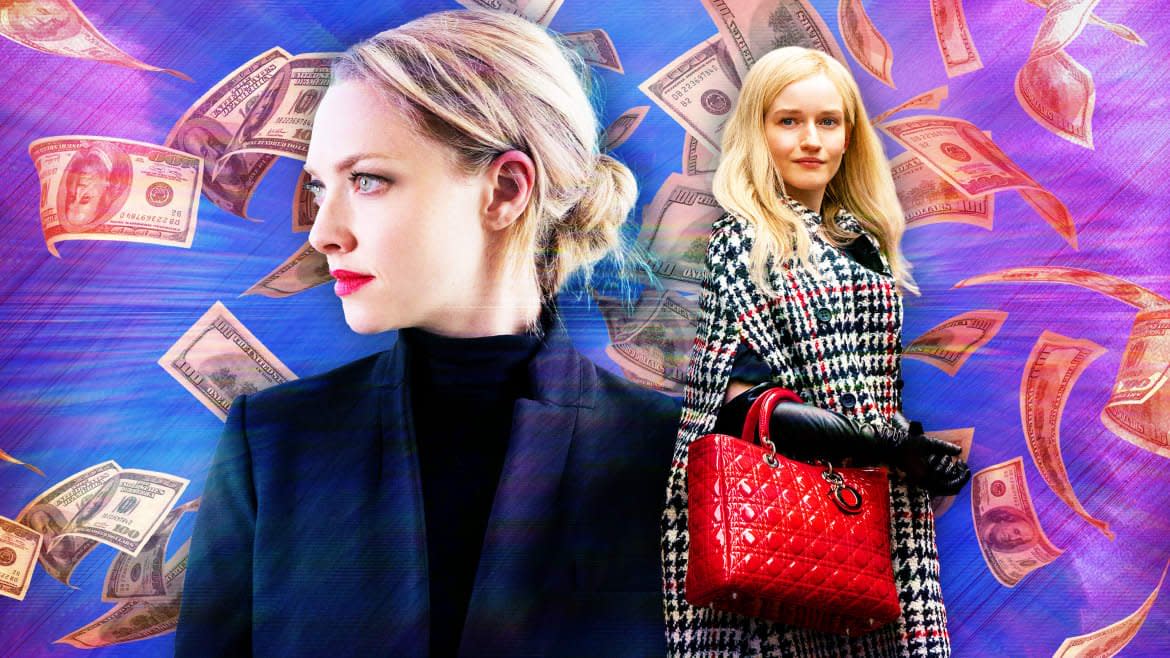How Elizabeth Holmes Saga ‘The Dropout’ Avoids ‘Inventing Anna’s’ Silly Mistakes

- Oops!Something went wrong.Please try again later.
- Oops!Something went wrong.Please try again later.
Near the beginning of The Dropout, Hulu’s latest drama inspired by a real-life scandal, a young Elizabeth Holmes runs on a track as a pre-teen. The moment, which occurred in Holmes’ real life, spoke to The Dropout creator Elizabeth Meriwether, who frames the anecdote as an early manifestation of the future Theranos fraudster’s irrepressible energy—even in the face of obvious defeat.
The sweaty scene makes a fascinating starting point for a story that will inevitably end in chilly, black-turtlenecked disaster. It’s not an origin story or even one of those “aha!” scenes that unlocks a character’s entire trajectory. But as viewers watch young Elizabeth Holmes’ hopeless march around the track, her drive is palpable—a forward motion that just won’t quit, even when it desperately needs to.
Amanda Seyfried Nails Theranos Scammer-Weirdo Elizabeth Holmes in Hulu’s Excellent ‘The Dropout’
I found myself thinking about that scene a lot as I continued to plod through Inventing Anna. On the surface, it seems The Dropout should have a lot in common with Netflix and Shonda Rhimes’ take on the “Soho grifter” Anna Delvey. Both focus on white women whose confidence, energy, and (most importantly) knack for lying vaulted them to the top echelons of society—and both allow viewers to revel as their respective houses of cards come crashing down. But one key difference sets these scammy shows apart: While The Dropout imagines the human story behind the viral news saga, Inventing Anna gets lost in the legend.
Beyond the obvious similarities between their respective bottle blondes, Inventing Anna and The Dropout tap into a shared thematic landscape. For instance: Both deal with some seriously shitty men.
Inventing Anna finds Julia Garner’s Anna Delvey struggling to contain her explosive temper before an ongoing parade of venture capitalists and tech bros who seem happier to compare her to their daughters than to their peers. Amanda Seyfried’s Elizabeth Holmes, meanwhile, spends much of The Dropout fielding unsolicited advice from men (including her greasy next door neighbor) about how a woman should speak, dress, and act to be taken seriously. The irony that both of these women were unqualified for the spaces they sought to enter—Delvey wanted to build her own foundation with zero business experience, and Holmes saw no issue with founding her own company as a college dropout also with zero business experience—only underscores the incompetence of the supposed gatekeepers themselves.
Another common riff: Both series posit that their extreme weirdness might’ve actually helped these women advance. As played with exceptional wit by Garner, Delvey’s eccentricities—her untraceable accent, her terrifying mercurial streak, her detached manner—sell her image as an heiress not just to fawning hangers-on, but also to business contacts. Seyfried, meanwhile, cultivates a low voice and encourages awkward dance parties among her colleagues—a signal that she, too, has figured out that in male spaces, it’s better to be seen as an outlandish woman than an ordinary one.
It’s here, however, that the two series diverge.
Inventing Anna, as the title suggests, is all about how Anna Delvey (neé Sorokin) became “Anna Delvey.” Megan Thee Stallion plays over montages of social media posts while various characters offer their takes on Anna’s ultimate legacy: scrappy genius or callous, thieving monster? The back half of the series prods at the con artist’s backstory, but the effort feels more like an afterthought, a late-in-the-game plot point, than a central thematic focus that helped shape what came before.
The Dropout takes more of an interest in Elizabeth Holmes’ inner life. While Inventing Anna jumps around in time as journalist Vivian Kent (Anna Chlumsky) pieces Anna’s story together in retrospect, Meriwether’s take on Holmes keeps things simple, unfurling her story chronologically. Seyfried plays Holmes over decades, a slow build toward the red-lipped anti-icon we all eventually came to know. Whereas Inventing Anna feels like a broader, ultimately shallow take on scammers and the voyeuristic materialist society that loves them, The Dropout feels like a more intimate character study—an examination of how, exactly, someone like Elizabeth Holmes ultimately ends up Like That.

Amanda Seyfried as Elizabeth Holmes in The Dropout
Here’s How to Watch Amanda Seyfried as Elizabeth Holmes in ‘The Dropout’ Online For Free
Maybe that’s why The Dropout seems less reluctant to make fun of its central figure, often seen dancing like a maniac or fawning over a Yoda quote that impresses no one but her. While Inventing Anna largely confines Garner’s performance to Delvey’s exterior eccentricities and seems compelled to redeem her, Seyfried has more space to mine her character’s social discomfort and complicated ego—a performance that scratches at something more human.
There’s a part of Inventing Anna that, like Vivian Kent herself, gets too close to Anna. The series treats her ambition as redemptive, and Vivian is almost as compulsive as her subject—pacing the halls at work until the very moment her water breaks and continuing to make calls even afterward. The Dropout, which introduces Elizabeth Holmes as a dorky but mostly relatable wunderkind, reveals her descent into narcissism incrementally. We’re asked to see ourselves not in Holmes as she is now, and not in that little girl running on the track, but in the horrified eyes of those who saw her transform from one into the other.
Get the Daily Beast's biggest scoops and scandals delivered right to your inbox. Sign up now.
Stay informed and gain unlimited access to the Daily Beast's unmatched reporting. Subscribe now.

